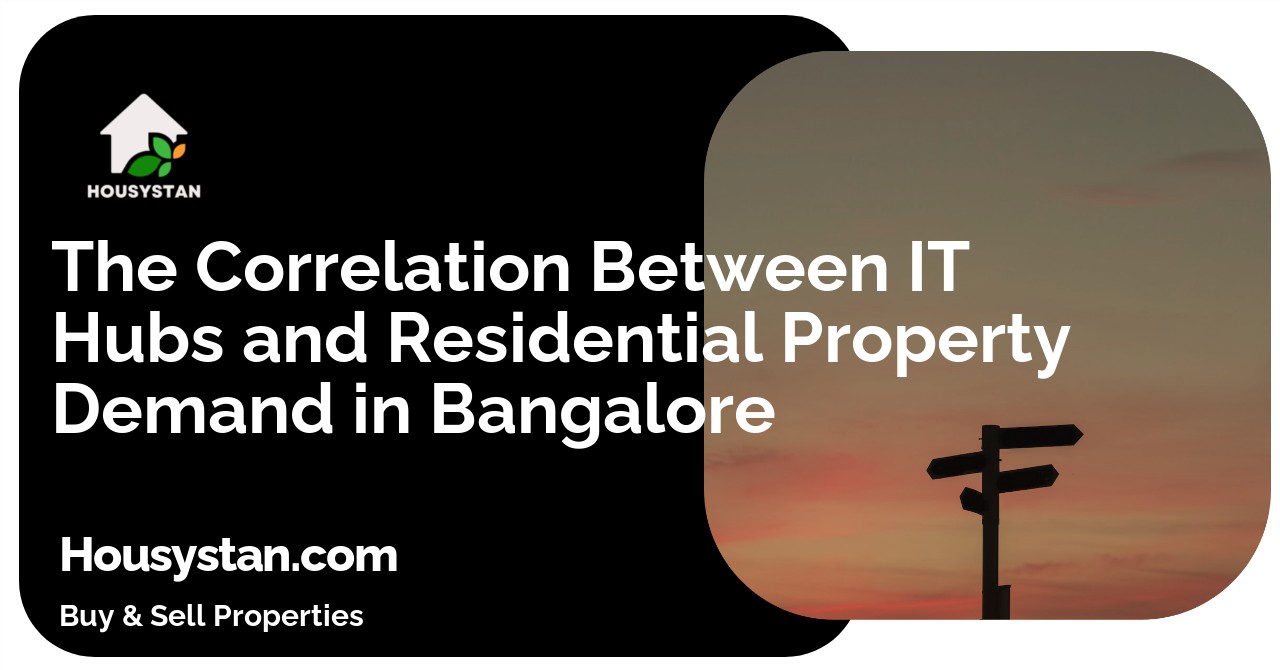The Correlation Between IT Hubs and Residential Property Demand in Bangalore
Read latest blogs and articles from Housystan

The Information mentioned here was last updated on:
25/1/2026The Correlation Between IT Hubs and Residential Property Demand in Bangalore
Bangalore, often referred to as the "Silicon Valley of India," has witnessed a remarkable transformation over the past few decades. Once known as the city's garden, it has emerged as a bustling IT powerhouse. This metamorphosis has not only increased Bangalore's commercial significance but also reshaped its residential real estate landscape. The growth of IT hubs in the city has had a profound impact on residential property demand.
Understanding the Rise of IT Hubs in Bangalore
- Verified Tenants/Buyers
- Unlimited Property Listing
- Zero subscription/charges fee
In the 1990s, Bangalore began to attract major technology companies due to its pleasant climate, skilled workforce, and proactive government policies. Over the years, top global companies such as Infosys, Wipro, and IBM have set up large campuses in the city, triggering a domino effect. The establishment of these IT hubs spurred the growth of smaller tech firms and startups, further cementing Bangalore’s reputation as a tech giant.
The most well-known IT hubs in Bangalore include Electronic City, Whitefield, and the Outer Ring Road region. These areas are home to numerous tech parks and office spaces that host thousands of IT professionals. The migration of companies and talents into these areas has directly impacted the demand for residential properties.
The Impact on Residential Property Demand
The development of IT hubs in Bangalore has led to a surge in residential property demand in multiple ways. With an influx of IT professionals from various parts of the country, there's a growing need for housing near these workspaces.
Proximity to Workplace: One of the primary reasons for increased property demand is the desire to live close to work. Traffic congestion is a significant issue in Bangalore, so living near work not only saves time but also reduces commuting stress. Areas like Whitefield, HSR Layout, and Sarjapur Road have gained popularity among homebuyers for their proximity to IT hubs.
Rise in Disposable Income: The IT industry offers lucrative salaries, leading to a rise in disposable income among its workforce. This increase in purchasing power enhances the capacity to invest in real estate. As a result, there is high demand not only for rented accommodation but also for homeownership.
Infrastructure Development: The establishment of IT hubs has prompted government and private entities to boost infrastructural development. Improved roads, better public transport, and connectivity enhancements make certain areas more attractive to potential homeowners. The presence of malls, schools, hospitals, and recreational facilities further adds to the appeal of these regions.
Notable Residential Areas Influenced by IT Growth
Several areas in Bangalore have experienced a property boom due to their proximity to IT hubs. Here’s a closer look at some key regions:
Electronic City: Known for housing a significant number of IT companies, Electronic City is a sought-after residential area. Affordable pricing compared to city-center properties makes it a favorite among IT professionals. The area is equipped with excellent infrastructure, including well-paved roads and efficient public transport facilities.
Whitefield: It hosts several IT parks and has undergone tremendous transformation. Once a quaint settlement, Whitefield is now synonymous with modern lifestyle conveniences. The demand for luxury apartments in this area has grown due to its chic lifestyle offerings, including high-end malls, cafes, and educational institutions.
Sarjapur Road: This locality bridges several major IT hubs and is ideal for IT professionals seeking homes. With a mix of ready-to-move-in apartments and prospective projects, Sarjapur Road offers myriad choices for homebuyers. The area’s popularity is further enhanced by multinational schools and healthcare facilities.
Influence on Property Prices
The correlation between IT hubs and residential demand is not merely a matter of volume but also of pricing. High demand near IT clusters often signifies property appreciation. This is evident from the skyrocketing real estate prices in neighborhoods close to tech centers.
Appreciation Potential: Areas around IT hubs have consistently shown potential for price appreciation. Real estate investors view properties in such regions as promising assets due to the expected continuous demand driven by IT industry growth.
Rental Yields: With a constant influx of professionals looking for rental housing, landlords often benefit from inflated rental yields in areas adjacent to IT hubs. High demand ensures lower vacancy rates, making these properties lucrative for rental income.
Urban Challenges and Future Trends
While the rise in IT hubs boosts residential demand, it also presents urban challenges. Increased population density has stretched Bangalore's resources, leading to traffic congestion, water scarcity, and pollution concerns.
Sustainability Measures: To tackle these issues, city planners are emphasizing sustainable development. There is an increasing focus on building eco-friendly residencies equipped with rainwater harvesting systems, solar panels, and green spaces.
Tech-Driven Solutions: As a tech city, Bangalore is also investing in smart urban solutions. The implementation of AI-driven traffic management systems exemplifies how technology is marshalled to improve the city's livability amid growing populations.
Emergence of New Localities: While established areas continue to thrive, newer localities are emerging as attractive investment destinations. As connectivity improves and new infrastructure projects are completed, previously overlooked regions are gaining attention as viable residential options.
Conclusion: A Long-Standing Relationship
The symbiosis between IT growth and residential demand in Bangalore is unmistakable. As Bangalore continues to evolve as a global IT destination, the city's real estate dynamics will adapt alongside. This interdependence ensures that as long as Bangalore remains an IT magnet, its residential property market will stay vibrant. The development of IT hubs has not only shaped the contours of Bangalore's skyline but also defined the essence of its urban fabric. From technology parks to tranquil neighborhood spaces, the interplay between work and home continues to narrate Bangalore's story of growth and transformation.